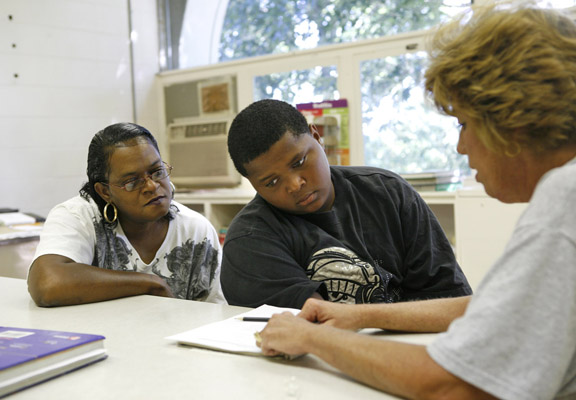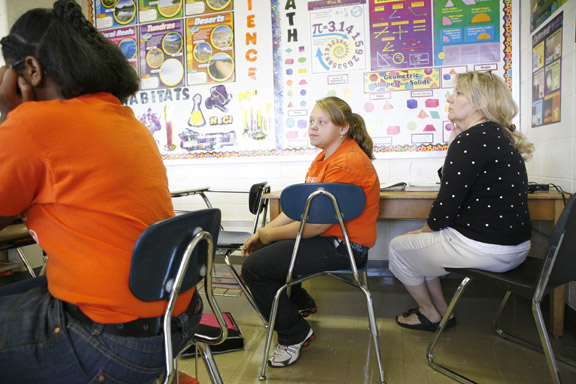
Tina Clark offers her son, Kenneth, support while he works with teacher Robin Flannery at Paris Middle School (Paris Ind.) Aug. 26, 2010.
By Susan Riddell
susan.riddell@education.ky.gov
As teacher Robin Flannery works with student Kenneth Clark on an algebra lesson, words of encouragement are being whispered in the boy’s ear.
Flannery tries to simplify the task by asking the 8th-grader to pick his favorite number. He pauses to think, but then the voice on the other side of him chimes in. “Tell her what your football number is,” she said.
That voice is Tina Clark, Kenneth’s mother.
Yet, this isn’t an after-school program or an extracurricular activity. Clark is one of many parents in the Paris Independent school district who volunteers their time during school hours in an effort to enhance learning and create a nurturing environment. The mother of nine children said she likes playing an active role in education – and not just with her own children.
“I help out mine while I’m here, but it’s not just my kids,” she said. “I’m here for anyone who needs me. I believe it’s important to support the staff and everybody here, and I’ll do anything they ask me to.”
Kenneth, a student at Paris Middle School, was working with his mother and Flannery in the Positive Approach to Student Success program. This isn’t the only way parents get involved in the district.
Parents are routinely inside a classroom filled with students. They can pull a student aside and work one-on-one for individualized attention, leaving a teacher to work with the other children.
“Research shows that parent involvement increases student achievement,” said Paris Middle Principal Jami Dailey. “Our small school size allows us to have close working relationships with our parents. We have an open-door policy that encourages parents to be part of the school day. Paris Independent understands that our parent involvement is the key to our success.”
That involvement extends to other activities beyond regular school hours. According to Leslie Spears, 21st Century Learning Center director, the district has hosted a transition picnic for incoming 6th-grade families, and every school has held an open house. In October alone, there was a popular Hispanic Heritage Night; a Lights On Afterschool event that included programs to keep kids safe, inspire them to learn and help working families; and a follow-up event to a Rachel’s Challenge presentation. Rachel’s Challenge works to spread Rachel Joy Scott’s belief that positive actions and beliefs can build a growing process of kindness. Scott was the first fatality in the Columbine High School shooting in 1999.

Parent volunteer Jennifer Frye works with 6th-grade student Kellie Medina during Michella Hopkins’ mathematics class at Paris Middle School (Paris Ind.) Aug. 26, 2010. Photo by Amy Wallot
“Hispanic Heritage Night is when our Latino families work together to introduce their culture to our students, parents and community leaders,” Spears said. “The Hispanic families fix a dish from their native countries and display items from their culture. It’s a really neat evening, and our attendance is always high.”
Livingston County
This western Kentucky district has made a concerted effort to get more men involved in the educational process with an archery program and the WATCH D.O.G.S. (Dads of Great Students).
Mary Dunning, 21st Century coordinator for Livingston County school district, credits the archery program with helping many students excel. Two volunteers, Wes Shuecraft and Jim Doom, sponsor archery activities weekly for students in grades 7-9.
“They are avid outdoorsmen who present wonderful role models for students,” Dunning said. “They are extremely patient and kind to an age group that is experiencing many changes in their lives. They encourage and praise our kids each time they get up to the shooting line. It is truly amazing to see these students emerge as confident archers at the end of the school year.
“This confidence has carried over in other areas as well,” Dunning added. “Some of our most shy students have come out of their shells and have become very outgoing. I wish that everyone could see the face of a child who makes that first bullseye. Without these volunteers we would not have been able to make such an impact alone.”
While archery targets student confidence, the WATCH D.O.G.S. have their eyes on protecting student well-being.
WATCH D.O.G.S. was founded by concerned father Jim Moore in the aftermath of the Jonesboro, Ark., school shootings in 1998. The Livingston County school district has implemented this program at its two elementary schools this year.
More than 100 dads have signed up, according to Sheri Henson, principal at South Livingston Elementary School.
In WATCH D.O.G.S., the dads check in upon arrival and receive a schedule to follow for the day.
“It starts with greeting students in the morning and being recognized on the morning news,” Henson said. Dads spend time in classrooms, the lunchroom and on the playground.
“We believe having a watch dog at our schools will provide our students with the presence of a positive male role model as well as offer additional security at the school during the day,” Henson said. “With a lack of male presence at our elementary schools, and some of our students not having fathers at home, we saw a great need to get our dads and other men more involved. We really needed a specific purpose planned when inviting the men to take part, and this program offered just that.”
The Pennyrile Allied Community Services Community Collaboration for Children purchased the initial toolkits needed to implement the WATCH D.O.G.S. program, and Family Resource and Youth Service Center/Community Education Director Stephanie Henson coordinated the implementation.
“Parents are the decisive factor in their child’s education,” Henson said. “We have great teachers and staff who do an excellent job educating our students, but it is the value that parents place on education that really makes the difference. We work hard to communicate with the parents to keep them involved in their child’s education through the use of planners, e-mails, notes, phone calls and our website. We know that parent involvement makes all the difference.”
Casey County
Like Paris Independent, the Casey County school district participates in the Lights on Afterschool and Rachel’s Challenge programs. Both hinge on teachers and parents working together to better a child’s education.
Casey County also uses parent volunteers for family literacy events, core content testing events, performance events for various after-school and summer programs, drama productions and communication related to student/family needs during out-of-school time, according to Rita Sweeney, district 21st Century coordinator.
Sweeney said the work the parents do on school productions is especially critical.
The drama productions are a “major event each year with parents and teacher sponsors working together to set stages, make costumes and facilitate the production,” Sweeney said. “Since we do not have an auditorium, we must turn our high school gymnasium into a theatre. Working with our teachers, principal and other staff, parents help to coordinate and set up the entire staging area, which involves hanging wires, backdrops, setting floor stages and set pieces as well as lighting and sound equipment, with one of our dads serving as what we call our ‘technical/staging engineer’ and another (along with his son) serving as sound engineer.
“The majority of the costumes for the show are put together by parents. One of our mothers actually helps to oversee the gathering of costumes, planning with teachers/directors and other parents, of course. She alone actually constructed more than 30 costume pieces for this year’s production.”
Karin Weddle, a National Board Certified Teacher in science at Casey County Middle School, agreed that parent involvement is vital in a child’s education, and it’s important to establish early communication with each of them.
“At the beginning of the school year, I request parent e-mail addresses,” Weddle said. “Throughout the year, I send parents information about classroom events and assignments. I can also use this to reach out to individual parents if I need them to contact me about their child’s progress.
“Also at the beginning of the year, each parent has an assignment on the first day,” she added. “It is titled ‘My Child in a Million Words or Less.’ This gives parents an opportunity to give me information about their child that will help me get to know them better and to instruct them better. Parents usually love this assignment.”
Weddle said middle school students often fail to inform their parents when they are struggling in school. If the teacher does not contact parents early, the child will continue to fall behind, she said.
“If parents are aware their child is struggling, most are very willing to do their part at home and to send their child to tutoring for extra help. This intervention needs to be taken care of early at the first signs of struggle. Once the parents are aware of the behavior, usually they will help at home, too. If the student is aware that the teacher makes frequent contacts with home, the problem can be resolved.”
Sometimes parents might be hesitant to go to a teacher, Weddle pointed out. When this is the case, the best way for teachers to reel parents into the school setting is to let them know they are always welcome.
“My door is always open,” Weddle said. “(Parents) are always welcome to discuss concerns with me. They must feel that they are welcome into the classroom and are encouraged to be involved in their child’s education. Many times parents may feel intimidated with the school setting and are not comfortable talking to a teacher. They must feel that the teacher welcomes their input.”
MORE INFO …
Leslie Spears, leslie.spears@paris.kyschools.us, (859) 987-2160
Mary Dunning, mary.dunning@livingston.ky.schools.us, (270) 988-4702
Rita Sweeney, rita.sweeney@casey.kyschools.us, (606) 787-6769



Leave A Comment